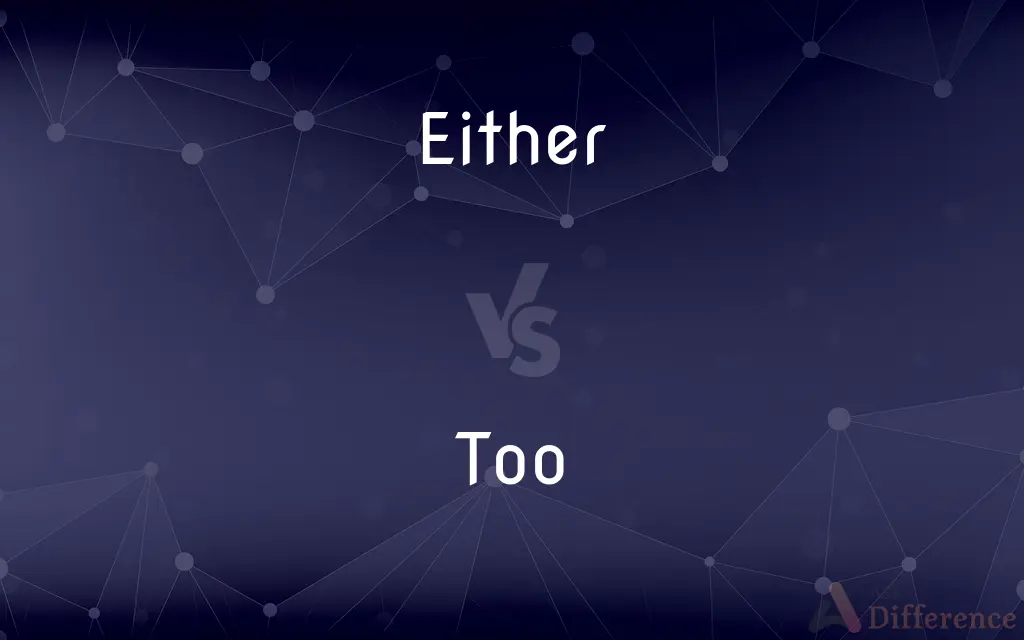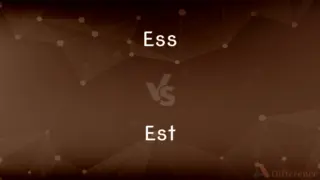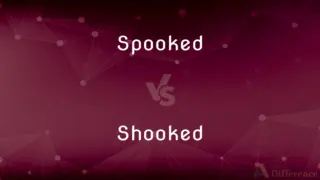Either vs. Too — What's the Difference?

Difference Between Either and Too
ADVERTISEMENT
Compare with Definitions
Either
Used before the first of two (or occasionally more) given alternatives (the other being introduced by ‘or’)
Either I accompany you to your room or I wait here
Available in either black or white
Too
To a higher degree than is desirable, permissible, or possible; excessively
He wore suits that seemed a size too small for him
He was driving too fast
Either
Used to indicate a similarity or link with a statement just made
It won't do any harm, but won't really help either
You don't like him, do you? I don't either
Too
In addition; also
Is he coming too?
Either
Used before the first of two (or occasionally more) given alternatives (the other being introduced by ‘or’)
Available in either black or white
Either I accompany you to your room or I wait here
ADVERTISEMENT
Too
In addition; also
He's coming along too.
Either
Used to indicate a similarity or link with a statement just made
It won't do any harm, but won't really help either
You don't like him, do you? I don't either
Too
More than enough; excessively
She worries too much.
Either
One or the other of two people or things
There were no children of either marriage
Their mortgage will be repaid if either of them dies
Too
To a regrettable degree
My error was all too apparent.
Either
One or the other of two people or things
Their mortgage will be repaid if either of them dies
There were no children of either marriage
Too
Very; extremely; immensely
He's only too willing to be of service.
Either
Used before the first of two or more coordinates or clauses linked by or
Either we go now or we remain here forever.
Too
(Informal) Indeed; so
You will too do it!.
Either
Any one of two; one or the other
Wear either coat.
Too
(focus) Likewise.
Either
One and the other; each
Rings on either hand.
Too
(conjunctive) Also; in addition.
Either
Likewise; also. Used as an intensive following negative statements
If you don't order a dessert, I won't either.
Too
(degree) To an excessive degree; over; more than enough.
Either
Any one (of two).
You can have it in either colour.
Too
To a high degree, very.
She doesn't talk too much.
I'm not too sure about this.
Either
Each of two; both.
There is a locomotive at either end of the train, one pulling and the other pushing.
Too
Used to contradict a negative assertion.
"You're not old enough yet." ― "I am, too!"
Either
Any one (of more than two).
Too
Used for emphasis, without reference to any previous statement.
Either
One or the other of two people or things.
He made me two offers, but I did not accept either.
Too
Over; more than enough; - noting excess; as, a thing is too long, too short, or too wide; too high; too many; too much.
His will, too strong to bend, too proud to learn.
Either
(obsolete) Both, each of two or more.
Too
Likewise; also; in addition.
An honest courtier, yet a patriot too.
Let those eyes that viewThe daring crime, behold the vengeance too.
O that this too too solid flesh would melt.
Such is not Charles his too too active age.
Either
As well.
I don't like him, and I don't like her either.
I know a cheap Spanish restaurant. It's not far from here, either.
Too
To an excessive degree;
Too big
Either
Introduces the first of two (or occasionally more) options or possibilities, the second (or last) of which is introduced by “or”.
Either you eat your dinner or you go to your room.
You can have either potatoes or rice with that, but not both.
You'll be either early, late, or on time.
Too
In addition;
He has a Mercedes, too
Either
One of two; the one or the other; - properly used of two things, but sometimes of a larger number, for any one.
Lepidus flatters both,Of both is flattered; but he neither loves,Nor either cares for him.
Scarce a palm of ground could be gotten by either of the three.
There have been three talkers in Great British, either of whom would illustrate what I say about dogmatists.
Either
Each of two; the one and the other; both; - formerly, also, each of any number.
His flowing hairIn curls on either cheek played.
On either side . . . was there the tree of life.
The extreme right and left of either army never engaged.
Either
Either precedes two, or more, coördinate words or phrases, and is introductory to an alternative. It is correlative to or.
Either he is talking, or he is pursuing, or he is in a journey, or peradventure he sleepeth.
Few writers hesitate to use either in what is called a triple alternative; such as, We must either stay where we are, proceed, or recede.
Can the fig tree, my brethren, bear olive berries? either a vine, figs?
Either
After a negative statement used as an intensive meaning something like `likewise' or `also';
He isn't stupid, but he isn't exactly a genius either
I don't know either
If you don't order dessert I won't either
Share Your Discovery

Previous Comparison
Ess vs. Est
Next Comparison
Spooked vs. Shooked













































